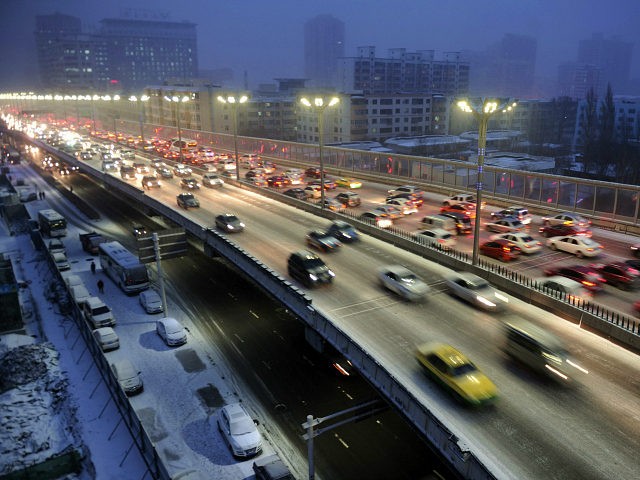China has mandated that all cars in one prefecture of western Xinjiang province carry government-issued tracking devices so that Beijing’s Communist Party officials are aware of the locations of all cars in Bayingol at all times.
The move is the latest in a string of measures China claims are necessary due to a growing terrorism problem in the Muslim- and Uighur-majority region of Xinjiang, far from the halls of power in Beijing.
“Cars are the major means of transportation for terrorists, and also a frequently chosen tool to conduct terrorist attacks. So it’s necessary to use the Beidou system and electronic vehicle identification to enhance the management of vehicles,” the Bayingol government said in a statement on the Chinese social media website Weibo.
Subscribing to the GPS tracking system is mandatory and costs $13 a year. “All vehicles must install the system, so that they can be tracked wherever they go. It also helps car owners to find their cars quickly if it’s been stolen or taken [by terrorists],” a Bayingol Public Security Bureau staffer identified as “Ma” told the Chinese state-run Global Times. Ma added that the government already documents all active vehicles, so it will be able to identify and punish citizens who do not install the tracking devices in their cars. Drivers of cars without the tracking technology installed will not be able to purchase fuel at gas stations, essentially stranding them.
Radio Free Asia reports that the plan to track all cars appeared to be in the works for months, with the government running a “pilot system” to test the viability of such a program before announcing the measure. Drivers have until June 30 to complete the installation of the device and comply with the law. Local officials told Radio Free Asia that police expect the measure to be put in place “across the board”: “This isn’t only happening here in Bayingolin; it’s everywhere [in Xinjiang], all of the vehicles everywhere.”
Xinjiang is home to the majority of the nation’s ethnic Uighurs, a Turkic, largely Muslim population who tend not to speak Mandarin and have loose ties to the Communist Party government in Beijing. Xinjiang is thus also home to the East Turkestan Islamic Movement (ETIM), a U.S.-designated Islamist terrorist group seeking to establish a Muslim Uighur state in Xinjiang. Uighur separatists have become increasingly active in violent attacks in the region, most recently stabbing five people to death in an attack last week. Police killed three of the individuals responsible, identifying them as “thugs” but not confirming whether they had any formal ties to ETIM or other Islamist groups.
Reuters estimates that the number of deaths at the hand of Muslim terrorists in Xinjiang are in the “hundreds” in the “past few years.” Xinjiang residents have also left the region to join the Islamic State, according to Chinese officials.
Beijing has responded to the latest stabbing attack with a rally of an estimated 10,000 police officers in Urumqi, the Xinjiang capital. The People’s Armed Police officers marched through Urumqi, driving their police vehicles as a way of “showing power to intimidate, lining up the forces,” according to the New York Times. “Continued vigilance and high-pressure deterrence against terrorists have forced them to the end of the road, like a cornered beast driven to desperate action,” one Communist Party official said of the rally, the South China Morning Post reported.
The police rallies follow years of new imposing regulations meant to curb not just Islamic extremism, but the practice of Islam generally. As a Communist country, China barely tolerates religion, only allowing those in which the Communist Party has control over the appointment of clerics and messaging during services. In Xinjiang, Communist Party officials have been banned from practicing the Ramadan fast, and wearing a burqa in Urumqi is illegal. The law requires Muslim shops to sell haram items like cigarettes and alcohol as a means of diluting the practice of Sharia law.
To keep political dissidence at bay, the Chinese government has launched a campaign called “Revealing Errors,” in which Uighurs living in the region are encouraged to tell Communist Party officials of any political “mistakes” they have made and ask for forgiveness. “The central question asked at these meetings is, ‘Have you ever watched, saved, or forwarded harmful religious or separatist postings or [media] clips, or have you ever seen anyone else do this?’” a police officer told Radio Free Asia.

COMMENTS
Please let us know if you're having issues with commenting.